TY
Transition Year ProgrammeTransition Year
Transition Year Programme
Duiske College is delighted to announce it’s participation in the Future Leaders Transition Year Programme.
The “Future Leaders Transition Year Programme” is a joint initiaitive from the GAA and the Professional Development Service for Teachers (PDST). It is a cross-curricular programme comprising of a series of modules designed to encourage maturity, initiative, responsibility and leadership skills in pupils.
The Programme gives pupils the knowledge and skills to support all roles required in the effective staging of Gaelic Games. As part of the programme pupils are challenged to organise and run a GAA Super Games Blitz or set up a Super Games Centre for younger students and/or support coaching of younger players in their school or community.
Supporting Personal, Social, Vocational and Educational Development

Duiske College offers an extensive and successful Transition Year programme. Over 27,000 young people are following a Transition Year programme in approximately 540 schools and we are proud to be among those.
The Transition Year Programme promotes the personal, social, vocational and educational development of students and prepares them for their role as autonomous, participative and responsible members of society.
It provides a bridge to enable you to make the transition from the more dependent type of learning associated with the Junior Certificate to the more independent learning environment associated with the senior cycle. It encourages personal and social development and recognises the need for you to grow in independence. Transition Year fosters academic achievement as you prepare for a Leaving Certificate programme, further study and adult and working life. It encourages the development of a wide range of transferable critical thinking and creative problem-solving skills.
Our programme works towards achieving a balance between some continuation of essential core subjects, a tasting and sampling of other subjects, a variety of distinctive courses designed to broaden horizons and some modules and activities specifically aimed at promoting the maturity that is central to the whole Transition Year ideal.
The TY programme at Duiske College offers a work experience programme. The Mini-company, where students set up and operate a real business, is a popular way of learning. The use of visiting speakers as well as trips beyond the classroom is features of our programme. Project work, where students undertake independent research, usually more extensive than traditional ‘homework’, is also common at Duiske College. Business in the community link with Glanbia is an integral part of our TY program which includes, mock interviews, research projects, presentations and site visit while working with Glanbia professionals.
Assessment is a key part of any worthwhile learning programme. Transition Year is an opportunity to move beyond the narrow focus of end-of-year written exams. The emphasis is on varied and on-going assessment with students themselves becoming involved in diagnosing their own learning strengths and weaknesses. Project work, portfolio work and exhibitions of students’ work are also encouraged. We make our own arrangements for reporting to parents and for the certification of students who complete our TY programme.
For further information. please see TYIreland.
Students
Extra Curriculars
Faculty
Years Established
Get In Touch
Location: High St, Brandondale, Graiguenamanagh, Co. Kilkenny
Telephone: (059) 972 4177
Email: info@duiskecollege.ie
School Hours: M-F: 9am - 4pm
Code of Behaviour
Duiske College prides itself on the quality of relationships between students and staff. Within this context Duiske College’s first instinct is to praise and reward students who reach the positive behaviour standards we wish for.
An important part of the school’s Code of Behaviour is the effort made to acknowledge the good behaviour of our students Primarily, the individual teacher praises and affirms good behaviour and constantly liaises with Class Teachers, School Management and the Student Support Team to appropriately reward and highlight incidents of good behaviour.
